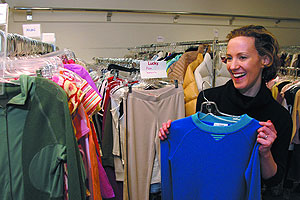

 |
||||
|
France spoke on campus a few years ago about maintaining her Oberlin values while working in the publishing field. She advised students to let "the big magazine articles pay for what you really care about." In her case, profiles of entertainers paid the bills (she was writing a cover story on Jennifer Lopez for Elle at the time) and allowed her to take on less-lucrative work with publications like The New York Book Review. France has no doubt that her Oberlin connection has been an asset. As she climbed the magazine world's spiny ranks, she bumped into other alumni who helped her along the way. As an editorial assistant at 7 Days, a defunct New York weekly run by fellow Obie Adam Moss '79 (now editor of The New York Times Magazine), she earned $15,000 a year. She then moved to Sassy, the late, editorially acclaimed girl magazine edited by Jane Pratt '84. There she attracted a near cult-like following which still bemoans the magazine's demise. By 1993, France had moved on to Elle, where she orchestrated its entertainment coverage. She also profiled renowned author Naomi Wolf and conducted an argumentative interview with social critic Katie Roiphe, who had written a controversial book discounting the incidence of rape on college campuses. In 1994, France returned to a weekly magazine, New York, where she picked up pointers for how to become a good editor from her boss, Kurt Andersen. Then came a two-year stint as editor-at-large for Spin, where she covered Courtney Love and other pop stars. It was pure luck that France met Conde Nast editorial director James Truman at a party on the Lower East Side in 1998. Truman was contemplating a magazine about shopping and tapped France to create a prototype. She was elated. "It was an amazing opportunity to be asked to develop a magazine by such an interesting, talented, creative guy at Conde Nast," says France's colleague Amy Gross, editor of O magazine. "Of course, she hung around for it." After a well-received test issue launch, the magazine went monthly in February 2001. To familiarize readers with Lucky, Conde Nast bankrolled a huge promotional campaign. Lucky's target audience: women in their 20s and 30s. Its mission: to help them shop. "It is a magazine about shopping, but it is not label-conscious," France says. "It features an expensive $365 Gucci slingback shoe next to a $59 Payless slingback. There's something really democratic about what we're doing." The picks are made by staffers, not celebrities. In fact, the magazine is devoid of big-name models. The clothes are laid out on the page as if on invisible mannequins or average-looking women, so readers don't have to wonder how a dress on a supermodel would look on them. And while France isn't feeding the poor with Lucky, she is helping the less fortunate. In the back of each issue, readers are told where they can donate cell phones to battered women and the elderly. Lucky also has an alliance with Housing Works, a New York organization that provides housing for people with AIDS. It's a fairly edgy charity for a mainstream women's magazine, France adds. Since its debut, Lucky has drawn mostly praise from its readers, including letters that begin along the lines of "I wanted to hate this magazine, but..." However, France does have her critics, including those who have branded Lucky a "magalog" and her old Sassy fans venting on Internet chat rooms. The remarks don't bother her. "For the most part, there isn't a criticism of Lucky that I haven't thought of," she says. "As long as our readers and advertisers like it, I really couldn't give a sh*t what this little circle of New York media watchers thinks." "Lucky could have been vulgar," adds Gross. "It could have been bossy. It could have been you-have-to-have-this-item-or-die. But it's not. It's very straightforward and fun." When pressed, France says the magazine reflects her own self in that it is a magazine without pretense. "I'm a person without much pretense. I believe women are allowed to think difficult thoughts and really superficial thoughts at the same time. I've lived my whole life that way." Jacqueline Marino is a freelance writer in Cleveland |
|
|
